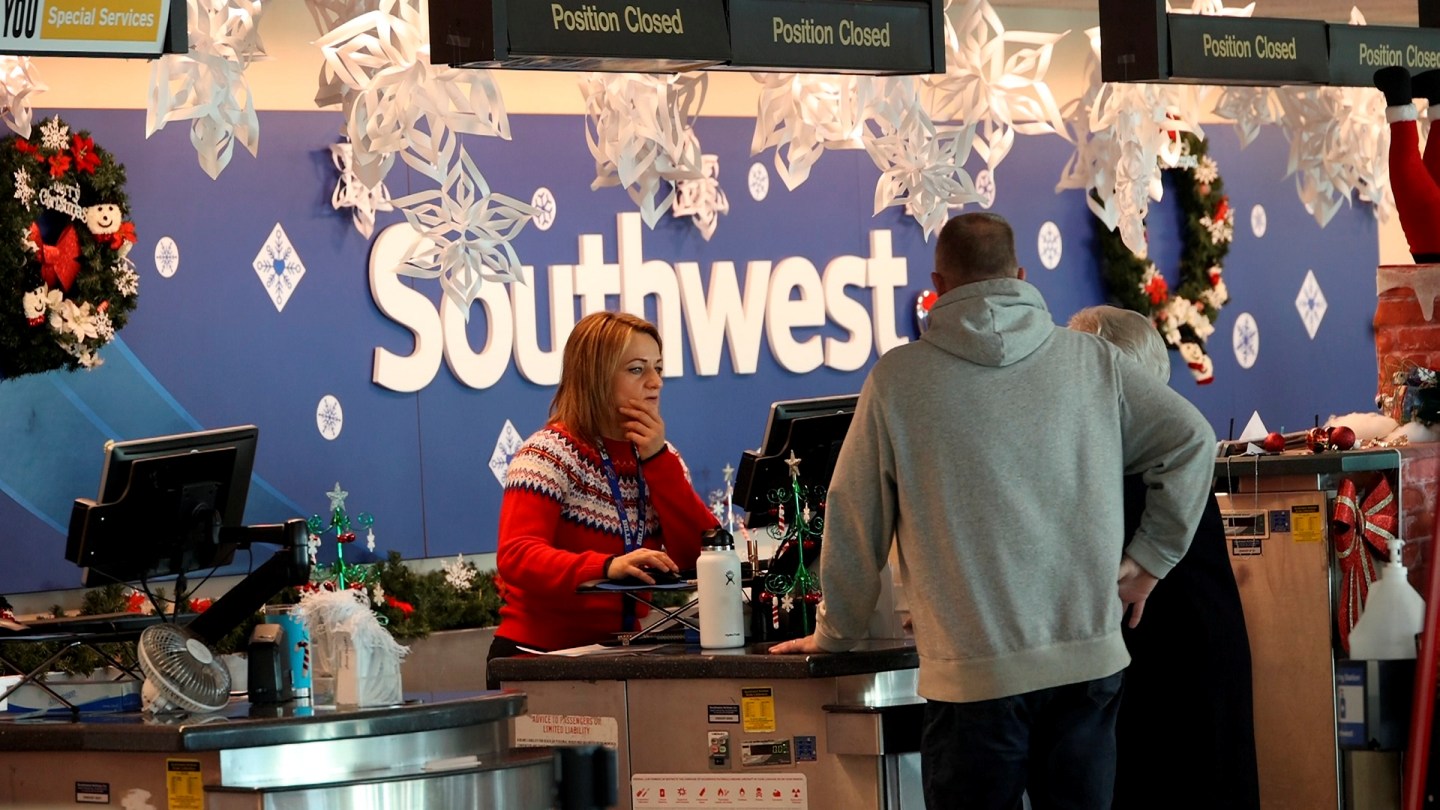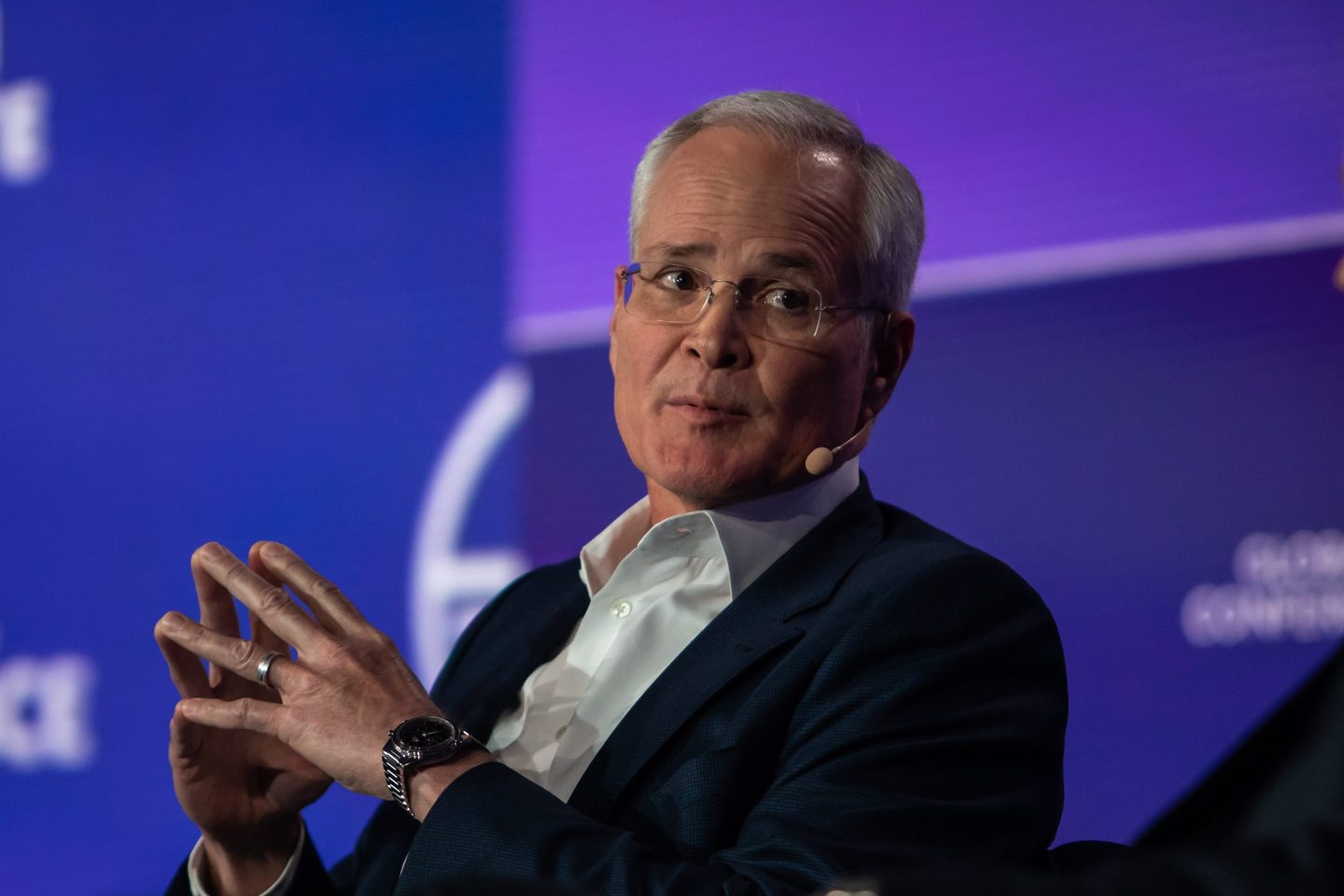Good morning. Maria Aspan, senior writer at Fortune, here.
Southwest Airlines is having a rough start to this holiday season, thanks to an ongoing hangover from last Christmas.
On Monday, the U.S. Department of Transportation said it had fined Southwest a record-breaking $140 million over last year’s holiday meltdown, when a winter storm led the airline to cancel almost 17,000 flights and strand more than 2 million travelers. The government said Southwest’s penalty, for “numerous violations of consumer protection laws,” is 30 times larger than any prior Dept. of Transportation fine over consumer protection violations.
Now, as a record 7.5 million people are predicted to start flying for this December’s holidays, Southwest is hoping it can move on from last Christmas. The airline said it has “learned from the event, and now can shift its entire focus to the future.” (It’s trying to look forward on multiple fronts; also this week, Southwest reached a tentative labor agreement with its 11,000 pilots, after three and a half years of negotiations.)
Still, it remains to be seen whether Southwest—or any other individual airline—can avoid a similar meltdown this holiday season. That $140 million penalty is one of the most headline-grabbing reminders of just how miserable flying is these days, as I wrote in a recent analysis for Fortune. But it’s far from the only one: Flying is now so terrible that the U.S. government literally can’t keep up with all the people complaining about it.
In 2022, the Dept. of Transportation received more than 77,600 official consumer complaints—up 55% from 2021, and more than five times the pre-pandemic levels of 2019—about delays, cancellations, refunds, boarding, baggage, and a whole host of other air travel problems. This year, more than 38,100 consumers filed complaints during the first five months of 2023, according to the federal agency’s monthly Air Travel Consumer Report—and that’s where the data stops. More than half a year later, the Dept. of Transportation says it’s still struggling to work through the flood of complaints it has received from unhappy airline customers since the end of May.
“It is increasingly clear that consumer complaints are not returning to pre-pandemic levels,” the monthly report says of the data backlog.
So the problems with air travel go far beyond one airline or one holiday meltdown or one “hellish” summer of post-Covid vacation chaos. When Benjamin Franklin wrote that “nothing is certain but death and taxes,” he clearly hadn’t experienced the inevitable dysfunction of modern air travel.
The air travel system “is so miserable for so many people—and has real downsides for the country,” as author Ganesh Sitaraman told me. A law professor at Vanderbilt University and a longtime former adviser to Elizabeth Warren, he’s written a perfectly-named and well-timed book about the roots of our national breakdown: Why Flying Is Miserable: And How to Fix It.
Sitaraman’s advice for “how to fix it” involves various proposals for increasingly regulating the airline industry—proposals that it’s hard to see airlines or many other business interests embracing. But, he points out, our broken air travel system hurts employers and business interests along with consumers:
“Who wants to start a Fortune 500 company in a city that doesn’t have an airport, or that doesn’t have much airline service?” he says. “That’s a real downside for economic growth and vibrancy and opportunity in lots of different places.”
Read my full article here. Happy holidays, everyone—and good luck with your travel plans.
Maria Aspan
maria.aspan@fortune.com
@mariaaspan
Leaderboard
Ann Anthony was named the first CFO at Oberon Fuels, a renewable fuels provider. Anthony will work toward growing the business as it scales up the commercializations of its renewable DME and methanol. She brings nearly 30 years of experience, including introducing OPAL Fuels, a renewable natural gas company, to the public markets. Before OPAL Fuels, Anthony served as the CFO and secretary for Key Capture Energy, a VC-backed start-up focused on stand-alone battery storage in key electricity markets.
Morné Engelbrecht was named CFO of Metals Acquisition Limited (NYSE:MTAL), effective Feb. 10. Engelbrecht has more than 23 years of diversified experience. His most recent role was CEO and prior to that CFO at Beach Energy Limited, an Australian Stock Exchange listed oil and gas explorer and producer.
Big deal
Willis Towers Watson (WTW) has released its "2023 U.S. director pay trends," an annual analysis of pay for outside directors at S&P 500 companies. Pay has "reached new heights" as companies hope to attract and retain effective board members, according to WTW. Comparing year-over-year results between 2023 and 2022 proxy data found the total direct compensation increased 2% from $300,000 to $305,000. Overall total director compensation has maintained its upward trajectory, buoyed by both cash and equity compensation, according to WTW.
The year-over-year median pay mix remains constant at 39% cash and 61% equity, the research found. Sixty-two percent of companies disclosed pay program changes in 2023 compared with 55% of companies reporting changes in the prior year. Forty-two percent of companies increased the value of their annual equity grant, while 28% increased their annual cash retainer, according to WTW.

Going deeper
Why Supply Chains Are Key to Fighting Inflation, a report in Wharton's business journal, discusses why shoring up supply chains is another way the federal government can tackle persistent inflation and make sure store shelves aren’t empty.
Overheard
"We’re heading toward a burgeoning market for cybersecurity compliance, with the ripple effects resonating through legal corridors as fraudulent cybersecurity claims come under the judicial scanner. Proper security controls will no longer be a choice, but a legal and economic imperative, marking a new epoch of digital resilience and a reinforced economic structure."
—Eric Noonan, the CEO of CyberSheath, who served with the United States Marine Corps, Central Intelligence Agency, wrote in a Fortune opinion piece.
This is the web version of CFO Daily, a newsletter on the trends and individuals shaping corporate finance. Sign up for free.












